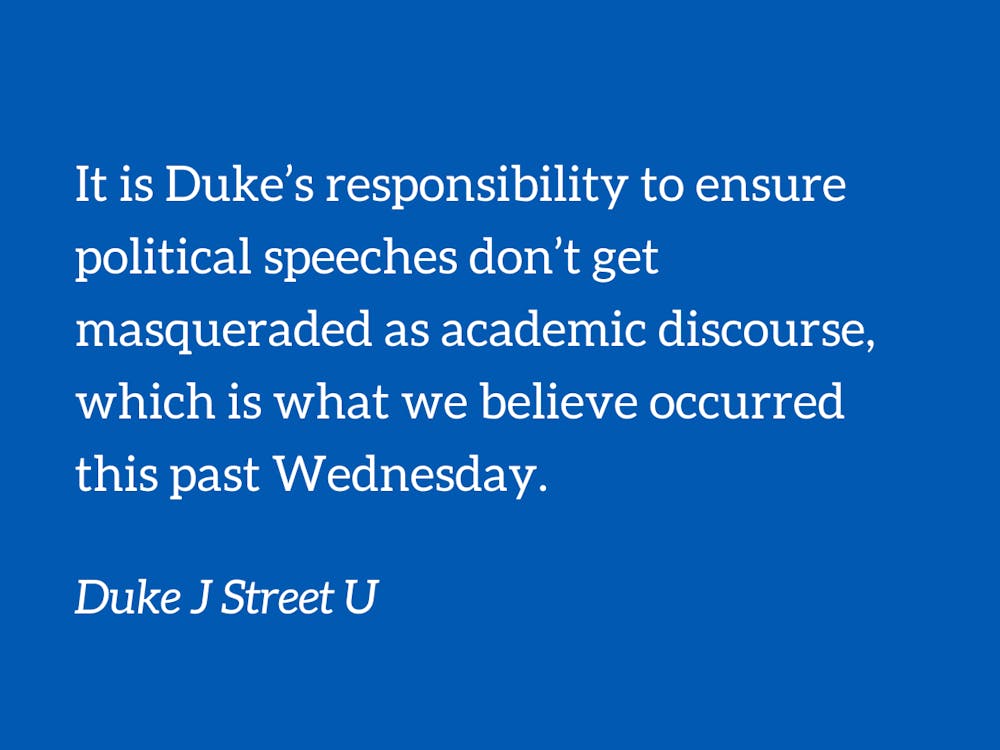Naftali Bennett knows that young American Jews are at a turning point in their relationship with Israel and Palestine. It’s no surprise, then, that the former Israeli Prime Minister used his platform at Duke to defend the status quo.
We are writing as the executive board of Duke University J Street U, a pro-Israel, pro-peace and pro-democracy organization, and as students who are also pro-Palestine. Last Wednesday we attended Bennett’s discussion in Page Auditorium. Afterward, some of us also attended a private reception with Bennett involving a Q&A with Jewish student leaders.
Consistent with our commitment to free speech and open debate, we were prepared to hear Bennett have an honest dialogue with moderator Bruce Jentleson, William Preston Few distinguished professor of public policy. But rather than challenge Bennett, Jentleson sat idly by as Bennett evaded tough questions and directed the conversation toward his own accomplishments. He is, after all, a politician, speaking with an agenda to strengthen Jewish-American support for Israel. Consequently, many of the students with whom we spoke after the event were enthralled with Bennett’s agreeableness. They might be surprised to find out that he is not the moderate politician he claims to be. In fact, Bennett has previously admitted to being “more right wing” than Benjamin Netanyahu — the current prime minister who has been attempting to undermine the judicial process in Israel.
The organizers of this event failed to deliver the promised productive dialogue. As students fighting both the normalization of Israeli occupation and the silencing of criticisms of Israel on campus, we were deeply concerned by what we heard.
At the center of Bennett’s talk was the promotion of so-called radically moderate politics. He boasted his “70/70” philosophy from his time in office, in which his government only focused on the 70% of concerns that 70% of Israelis agree on. Conveniently, that missing 30% includes resolving the conflict with the Palestinians. “When you pull out of the ideologically tense issues,” Bennet proclaimed, “suddenly all the walls and all the moats around each other evaporate.” While this strategy permitted for some progress on other issues, it is also the exact politics that has allowed him to justify avoiding any meaningful action to end the occupation, while being lauded as a reasonable politician.
Particularly concerning was the twisted view of the occupation presented during the event. Without background knowledge, attendees might not have known to question Bennett’s implication that the Palestinian Authority is primarily responsible for making a two-state solution impossible — rather than the promotion of settlements in the occupied West Bank, which he has played a leading role in expanding. The moderator also did not question Bennett’s suggestion that Gazans and Hamas, who according to him could have been the “Singapore of the Middle East,” bear sole responsibility for their devastating economic circumstance — rather than Israel’s ongoing blockade and military operations. Bennett’s aggrandizement of a policy offering 20,000 work visas to Gazans came across as generous. In reality, 2 million people there still live in economic and geographic isolation.
Bennett also strategically preyed upon the fears of American Jews, the urgency of geopolitical threats such as Iran and Russia, and the ongoing presence of terrorism in the Middle East as justifications for maintaining a de facto occupation. These are complex concerns; Israel does face continuous and legitimate security threats. However, we condemn Bennett’s deflection of the reality that unjust and illegal methods have been used for decades in the name of addressing these threats, at the expense of occupied Palestinians.
The narratives espoused both during and after the event confirmed that Bennett was at Duke to rationalize the status quo of occupation in Israel and Palestine — and to celebrate his role in maintaining it — to young Americans and especially to young American Jews.
It was important for us to attend this event in order to better address the reception of Bennett on Duke’s campus. As members of J Street U, we are committed to continued participation in dialogues around Israel and Palestine on campus but urge that these dialogues occur with more prudent oversight. There should be greater consideration and respect for the student populations most impacted by these events — a consideration that was absent for the Muslim community, given that Bennett was scheduled to speak on the first night of Ramadan.
Furthermore, at an event whose introduction embraced critical engagement with ideas, we expected the moderator to reflect this value. If the moderator is not willing to interrogate the speaker's controversial messages, then an open-mic should be provided for those who disagree to express their dissent. If students aren’t given a chance to push back openly during the dialogue, then they shouldn’t be judged for being unwilling to listen.
Free speech should always be protected on college campuses, including for controversial political speakers. But it is Duke’s responsibility to ensure political speeches don’t get masqueraded as academic discourse, which is what we believe occurred this past Wednesday. As a Duke community, we must do better.
Signed, Executive Board of Duke J Street U
Duke J Street U is a chapter of the student organizing arm of J Street, which seeks to provide a “political home [to] organize pro-Israel, pro-peace, pro-democracy Americans."
Get The Chronicle straight to your inbox
Signup for our weekly newsletter. Cancel at any time.

